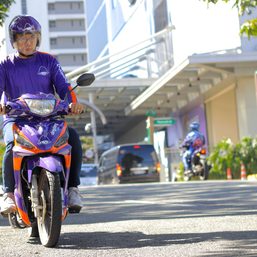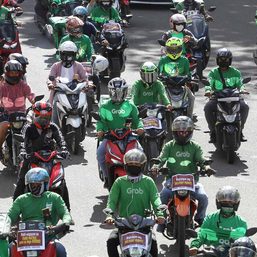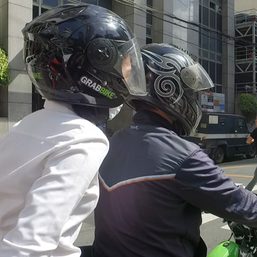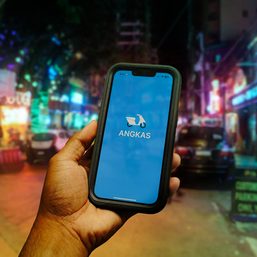SUMMARY
This is AI generated summarization, which may have errors. For context, always refer to the full article.

MANILA, Philippines – With high transportation fares and a lack of services, some commuters are resorting to illegal and potentially dangerous ride-hailing apps, the Land Transportation Franchising and Regulatory Board (LTFRB) said on Friday, January 27.
The LTFRB has identified two popular Russian-based ride-hailing apps – InDrive and Maxim – offering transport network vehicle service (TNVS) operations without any accreditation. That means these operators are not vetted when it comes to financial capacity, customer service, and driver accreditation and training.
“It undermines ‘yung security ng mga riding public natin. Hindi mo identified ‘yung tao, and then pag may nangyari sa’yo, there is no insurance na sasagot,” said LTFRB Chairman Teofilo Guadiz III in a press conference on Friday.
(It undermines the security of our riding public. You can’t identify the person, and then if something happens to you, there’s no insurance to cover you.)
For context, companies with TNVS operations must obtain permits from the LTFRB that certify them as transport network companies (TNC).
“If you are the TNVS company, gusto mo mag-conduct ng business dito, you have to go through the legitimate government process. Magparehistro ka muna, have yourself accredited, have yourself registered with the different government agencies,” the chairman said. “Hindi naman po namin sinasaway si InDrive at Maxim to enter into a legitimate business in the Philippines.”
(If you are the TNVS company and you want to conduct business here, you have to go through the legitimate government process. Register first, have yourself accredited, and have yourself registered with the different government agencies. We aren’t dissuading InDrive and Maxim from entering into a legitimate business in the Philippines.)
Who are these illegal TNVS providers?
Both InDrive and Maxim are Russian-owned companies. Although they have legitimate operations in other countries, the same isn’t true when it comes to the Philippines. They have no local offices, and no licenses or accreditation with government agencies.
Currently, the apps offer four-wheel and two-wheel ride-hailing services, along with food delivery services, depending on the area. Since they have no physical presence in the country, the LTFRB said that both companies recruit drivers through Facebook community posts.
As of January 27, both apps are still available for download in the Philippines through the Google Play Store and the Apple App Store, although the LTFRB is coordinating with the Department of Information and Communications Technology to restrict access to the apps.
Here’s a quick rundown of each of the illegal ride-hailing services.
InDrive
- Operates in Baguio, Bacolod, Pampanga, Cebu, Iloilo, and Cagayan de Oro.
- Sets fare prices through real time bidding, with passengers giving a proposed fare and the driver making a counteroffer.
- Based in Mountain View, California but founded in Yakutsk, Russia in 2013.
Maxim
- Operates in 41 cities and municipalities across the Philippines.
- Sets a flagdown rate of P10, with a fixed rate per kilometer; passengers can add tips to entice drivers to accept their booking.
- Established in 2003 as a taxi application service in the city of Chardinsk in the Ural Mountains, Russia.
The LTFRB warned that using these apps – or any unaccredited transport service – may expose passengers to “poor service quality, reliability, and safety.”
“Pag may nangyari sa inyo po sa daan – just like what happened in Metro Manila – hindi namin mahabol ‘yung kompanya (If something happens to you on the road – just like what happened in Metro Manila – we can’t go after the company) because there is no company to talk with in the first place,” he said.
Guadiz was referring to social media posts about a private motor vehicle posing as a TNVS provider and operating around a mall in Quezon City.
“The LTFRB received reports coming from social media networks about a vehicle allegedly offering TNVS services among commuters but in a forcible manner and charged a much higher fare,” the LTFRB said in a statement on Wednesday, January 25.
Why do commuters use them?
Despite lacking any government accreditation, Guadiz noted that commuters continue to avail of their services. He cited two possible: lower fare prices and a lack of ride-hailing services, particularly in the provinces.
Because passengers can negotiate the price with the driver, fares can come out cheaper than those of licensed TNVS providers.
“It’s cheaper. Unlike in other companies, may mga fixed price. Dito po, pag sagot ng driver, may negotiations kaagad. Magkano ang binibigay mo (there is a fixed price. Here, when the driver replies, you start negotiating. You give an offer), the driver makes a counteroffer, and then takes you for a ride,” the LTFRB chairman said.
Guadiz explained that the fares are lower in part because these companies are unregulated and most likely do not pay any local taxes.
“They don’t pay government fees. Mababa po ang singil nito (They charge less). But then again, these are illegitimate. Kapag may nangyari sa’yo, there’s no way for the LTFRB or for other government agencies na habulin ‘yung tao (If something happens to you, there’s no way for the LTFRB or for other government agencies to go after these people).”
However, the fact that commuters resort to illegitimate TNVS operators may also point to inadequate service providers, especially in the provinces.
“The very reason why these companies come up is because of probably lack of TNVC servicing units sa mga probinsya (in the provinces),” Guadiz admitted. “But ang solusyon po niyan (the solution is) is not for these companies to operate illegally, but to come in legally, register with us, and we will give them their proper franchise to operate in the province – hindi po ‘yung patago na ginagawa nila (not sneaking around like what they’re doing).”
Nevertheless, Guadiz maintained that the country has an “adequate number of TNVCs,” despite the proliferation of these unaccredited services.
He warned that owners and riders may face stiff penalties as the LTFRB begins to crack down on the illegal operations. Four-wheeled vehicle owners violating colorum rules may be fined up to P200,000, while two-wheeled vehicles may be fined P50,000. Drivers may have their license revoked and may also face jail time.
“Pakiusap na lang po, sa mga kababyan natin who are using these apps, ‘yung mga drivers (I’m asking those who use these apps, and the drivers), you better cease and desist. One of these days, ang sasakay po sa inyo will be an LTFRB agent or an HPG agent, and just like in Cebu, hinuli po ang driver. Inimpound po ang sasakyan (you’ll pick up an LTFRB agent or an HPG agent, and just like in Cebu, the driver will be caught. Your vehicle will be impounded),” the LTFRB chief warned. – Rappler.com
Add a comment
How does this make you feel?




There are no comments yet. Add your comment to start the conversation.